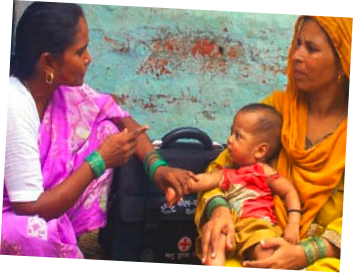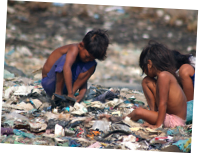

Pregnancy and Childbirth in Developing Nations
In developing nations, rates of infant and maternal mortality dwarf the rates in developed countries. Each year, over 600,000 women die due to pregnancy, childbirth, or postpartum complications, and 98% of those maternal deaths are in developing countries (Donnay, 2000). Women in developing countries are “300 times more likely to die in childbirth or from pregnancy related complications than those in a developed, industrialized country” (Kharsany, 2009:1).
According to his 2000 article, Donnay states: “Of all the health statistics monitored by the WHO, the largest gap between rich and poor nations is seen in maternal mortality levels. Over 90% of maternal deaths occur in Asia and sub-Saharan Africa... At present, one woman in 12 will die of maternal causes in sub-Saharan Africa, compared with one woman in 4000 in northern Europe.”
The rates of infant and maternal mortality in developing countries are astronomically high, and lowering the rates proves an arduous task. Donnay states that these rates may be lowered through:
• Strengthening reproductive healthcare delivery systems
• Ensuring skilled attendance at birth
• Promoting women-friendly health services
• District-level planning with community participation
• Monitoring progress with process indicators
• A rights-based approach to safe motherhood
In addition to these factors, increased education and the establishment of community healthcare networks can be implemented as a way to lower infant and maternal mortality.




Developing Countries
International Monetary Fund “Emerging and Developing Economies”
Afghanistan, Algeria, Angola, Antigua and Barbuda, Argentina, Aruba, The Bahamas, Bahrain, Bangladesh, Barbados, Belize, Benin, Bhutan, Bolivia, Botswana, Brazil, Burkina Faso, Burma, Burundi, Cambodia, Cameroon, Cape Verde, Central African Republic, Chad, Chile, China, Colombia, Comoros, Democratic Republic of the Congo, Republic of the Congo, Costa Rica, Cote d'Ivoire, Cyprus, Djibouti, Dominica, Dominican Republic, Ecuador, Egypt, El Salvador, Equatorial Guinea, Ethiopia, Fiji, Gabon, The Gambia, Ghana, Grenada, Guatemala, Guinea, Guinea-Bissau, Guyana, Haiti, Honduras, India, Indonesia, Iran, Iraq, Jamaica, Jordan, Kenya, Kiribati, Kuwait, Laos, Lebanon, Lesotho, Liberia, Libya, Madagascar, Malawi, Malaysia, Maldives, Mali, Malta, Marshall Islands, Mauritania, Mauritius, Mexico, Federated States of Micronesia, Morocco, Mozambique, Namibia, Nepal, Netherlands Antilles, Nicaragua, Niger, Nigeria, Oman, Pakistan, Panama, Papua New Guinea, Paraguay, Peru, Philippines, Qatar, Rwanda, Saint Kitts and Nevis, Saint Lucia, Saint Vincent and the Grenadines, Samoa, Sao Tome and Principe, Saudi Arabia, Senegal, Seychelles, Sierra Leone, Solomon Islands, Somalia, South Africa, Sri Lanka, Sudan, Suriname, Swaziland, Syria, Tanzania, Thailand, Togo, Trinidad and Tobago, Tunisia, Turkey, UAE, Uganda, Uruguay, Vanuatu, Venezuela, Vietnam, Yemen, Zambia, Zimbabwe;
Note - this category would presumably also cover the following 46 other countries that are traditionally included in the more comprehensive group of “less developed countries” which are:
American Samoa, Anguilla, British Virgin Islands, Brunei, Cayman Islands, Christmas Island, Cocos Islands, Cook Islands, Cuba, Eritrea, Falkland Islands, French Guiana, French Polynesia, Gaza Strip, Gibraltar, Greenland, Grenada, Guadeloupe, Guam, Guernsey, Isle of Man, Jersey, North Korea, Macau, Martinique, Mayotte, Montserrat, Nauru, New Caledonia, Niue, Norfolk Island, Northern Mariana Islands, Palau, Pitcairn Islands, Puerto Rico, Reunion, Saint Helena, Saint Pierre and Miquelon, Tokelau, Tonga, Turks and Caicos Islands, Tuvalu, Virgin Islands, Wallis and Futuna, West Bank, Western Sahara




